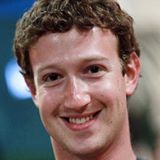
Mark Zuckerberg, the founder and CEO of Facebook, unveiled on his own Facebook page today a new ad from FWD.us, his pro-immigration reform PAC. The ad, titled "Emma", contains an altered version of Emma Lazarus' 1883 poem "The New Colossus", a work associated in many Americans' minds, no doubt, with the Statue of Liberty, in which it is engraved. In doing so, it departs radically from the meaning of Lazarus' original - which exalted the Statue of Liberty as a "mother of exiles" and redeemer of the world's rootless poor - to accommodate the PAC's call for more high-skilled workers from abroad be allowed to work and live legally in the United States.
"Give me your tired, your poor/ Your huddled masses yearning to breathe free", a voiceover quotes from Lazarus' poem as the ad begins. Then it veers off into original, more prosaic territory: "And give me the influencers and the dreamers/ Talent that is searching for purpose/ Those dedicated to the doing"
In place of these lines in Lazarus' original appears the single line: "The wretched refuse of your teeming shore". The ad's concluding lines return to the original, maintaining the meter but altering another crucial part. "Send all these, the boundless born to me/ I lift my lamp beside the golden door!" it says - this instead of "Send these, the homeless, tempest-tossed to me".
On Zuckerberg's Facebook page, the social media mogul wrote, "Drawing on our history as a nation of immigrants, "Emma" is the new ad from FWD.us showing how passing reform is our chance to keep America a magnet for the world's brightest and hardest working people." FMW.us calls itself "an organization started by key leaders in the tech community to promote policies to keep the United States and its citizens competitive in a global economy-including comprehensive immigration reform and education reform."
The PAC pushes for a US immigration policy which better accommodates the needs of American companies which stake their success on technological innovation. In April, Zuckerberg wrote in a Washington Post op-ed, "The economy of the last century was primarily based on natural resources, industrial machines and manual labor...only so much wealth could be created from them. Today's economy is very different. It is based primarily on knowledge and ideas - resources that are renewable and available to everyone... In a knowledge economy, the most important resources are the talented people we educate and attract to our country. A knowledge economy can scale further, create better jobs and provide a higher quality of living for everyone in our nation."
© 2025 Latin Times. All rights reserved. Do not reproduce without permission.




